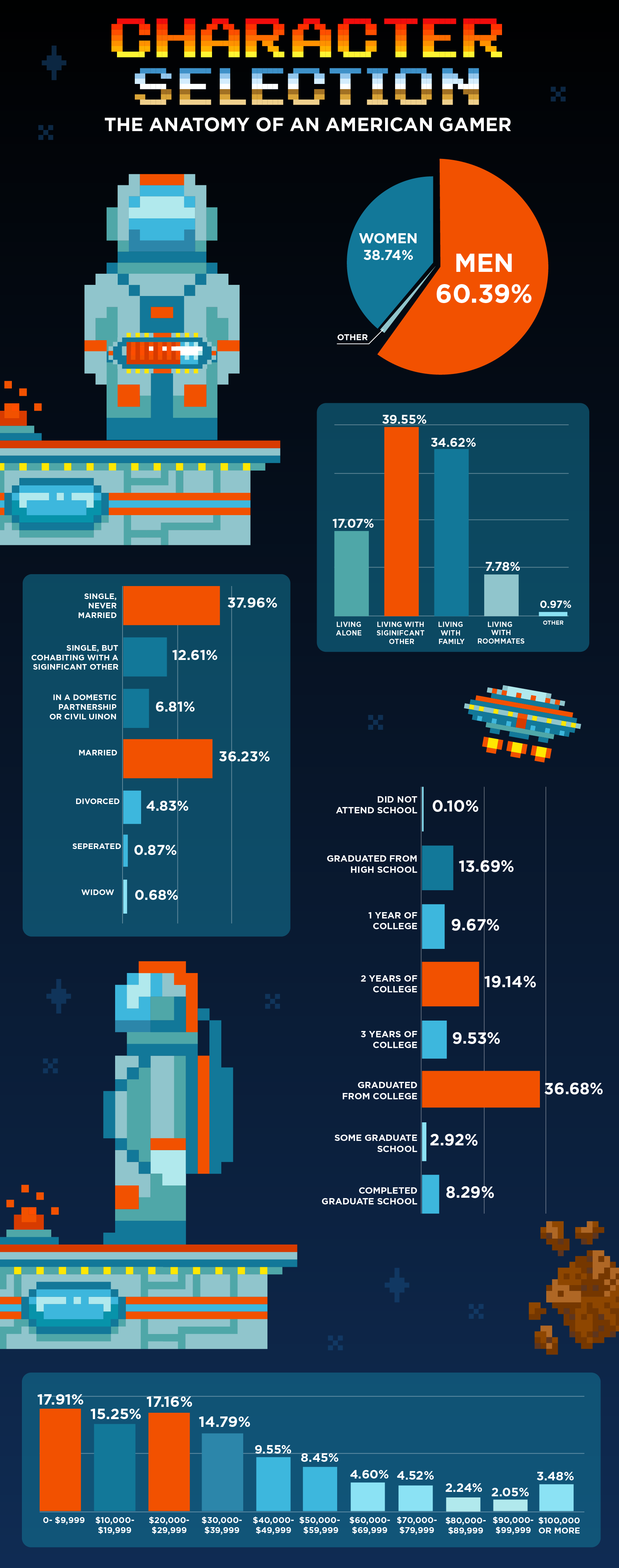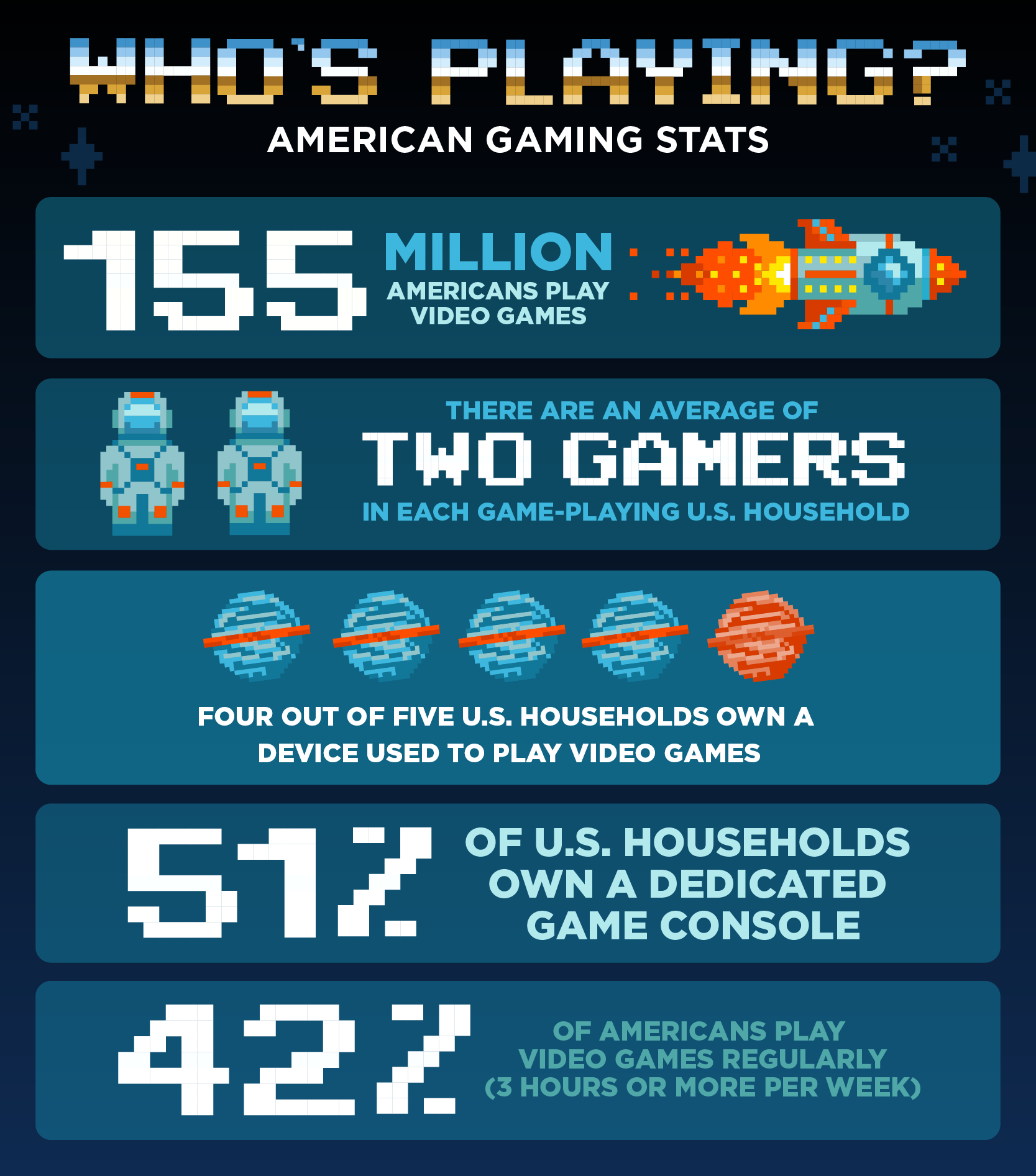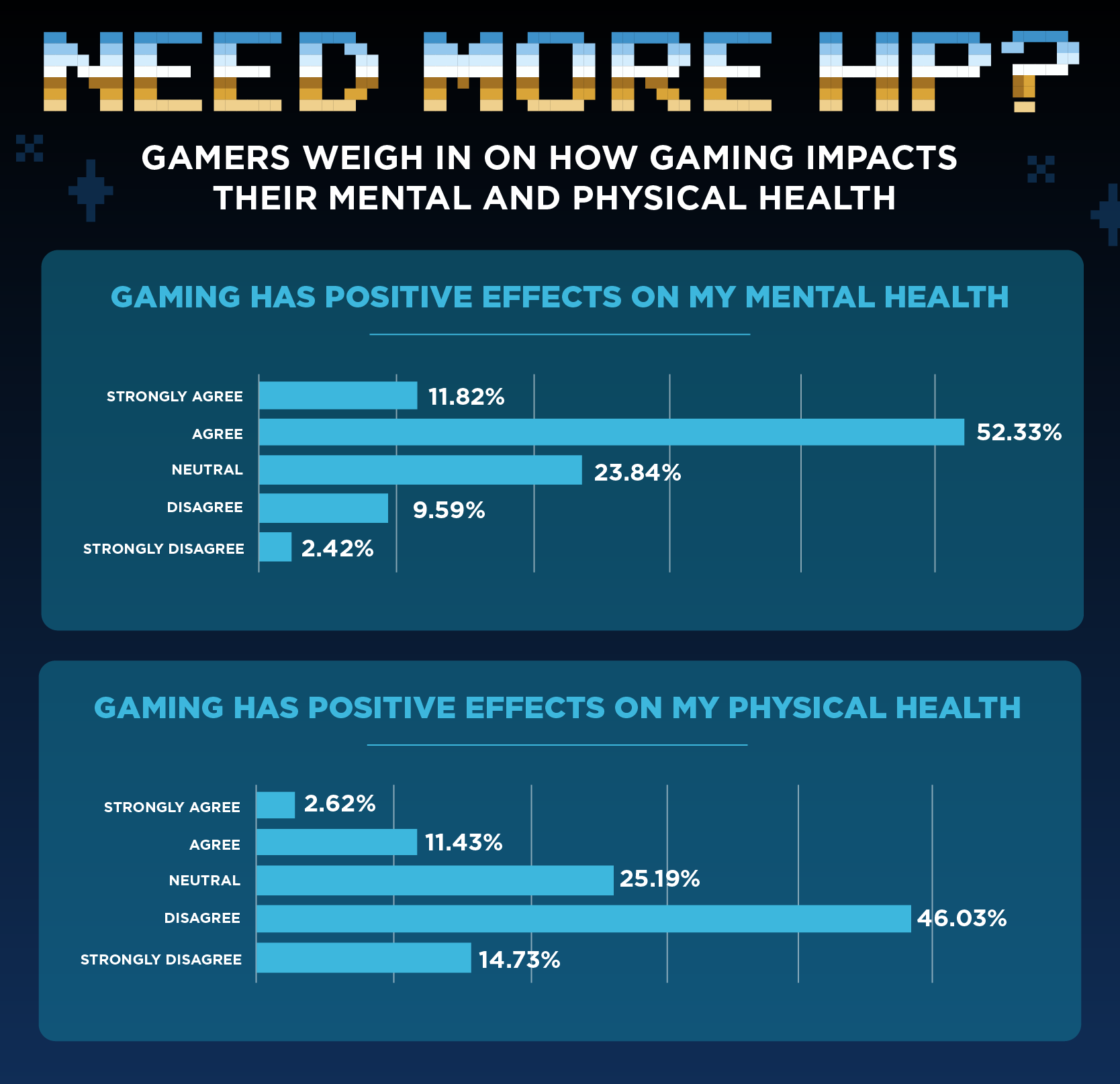
Video gaming is an $18 billion dollar industry in the United States. People play to relax, meet new friends, and, of course, to win. The hobby also offers a number of benefits: Playing games can hone decision-making skills, boost memory, sharpen reflexes, and improve multitasking ability. But gaming can also have a dark side. According to some experts, many people become hooked on the pastime, develop a video game addiction, and have a hard time cutting back—and that can take a major toll on their lives.
To get a handle on this interesting hobby, we went straight to the source: the gamers themselves. To gather video game addiction statistics, we surveyed 1,000 male and female gamers to get the inside scoop on just who these gamers are, where they live, how much playing time they log, how much they spend on gaming, and more. Keep reading for an exclusive look at the world of video gamers.
Portrait of a Video Game Player
When you picture an avid gamer, what comes to mind? A failure-to-launch 20-something living in their parents’ basement? A tech-savvy professional with money to spend on the latest consoles and newly released games? According to our survey, while a gamer is most likely to be male, women like games too: Female gamers comprised nearly 40 percent of our respondents. Around 4 in 10 live with a partner or significant other, and just over one-third report they live with family (which may include the parents). Another 17 percent live alone.
Over one-third of our respondents are college graduates, and around 40 percent have at least one year of higher education under their belts. However, just over half of our respondents earn less than $40,000 per year. A fairly equal percentage report earnings within each $10,000-dollar window, but the highest percentage reflects the lowest earnings: Just under 18 percent report annual earnings of less than $10,000.
Gamers by the Numbers
The video game industry is thriving. Nearly half of the population plays video games—an average of two people per household. When teens complain to their parents that everyone has that console they’re coveting, they may almost be right: Four out of five households own some type of video game device. But are they using those devices? Most are. Nearly half of Americans play games for three or more hours every week.
According to research, people who report they play more video games than they did a few years ago also say they’re spending less time on hobbies including watching TV, watching movies at home, and going to the movies. One reason? Many people feel that the entertainment that computer and video games provide gives them more bang for their buck than other activities, including going to the movies, watching DVDs, and listening to music.
The Hours Gamers Spend Playing
One game stands out for its ability to draw gamers into hours of play: World of Warcraft. Nearly half of our respondents rated this role-playing game the most time-consuming. Released in 2004, this popular online adventure game is the second highest–selling PC game of all time.
The Elder Scrolls V: Skyrim (an action role-playing game), Call of Duty (a first-person shooting game), and Minecraft (an adventure game that lets users build virtually anything) also gobbled up many hours for our respondents. Unlike the simple arcade games of the ’80s, many of these complex games enable users to explore fantasy worlds as the characters of their choice, solving problems, unraveling complicated storylines, and making friends with fellow gamers.
Among our respondents, gaming is a time-consuming habit. In the past year, survey participants estimated they spent at least 80 days plugged in … These marathon gaming sessions lasted nearly 13 hours on average.
Like illicit substances, video games are designed to trigger sensations in the brain that make people feel good—and sometimes they don’t want to stop. But too much gaming can damage people’s physical health, take a toll on their social life, impact their work, or simply take up so much time and energy that it’s not possible to properly complete the typical day-to-day tasks of life.
Money Spent on Video Games
Video gaming is one hobby that has become markedly more expensive during the last two decades. In 1996, people could purchase a PlayStation for $49—and today, that’s the basic price for a game. Games have become more complex, requiring larger development teams, and may also have pricey add-ons such as licensed content or characters.
Breaking it down by gender, men are more likely to splurge on games and hardware at virtually every price point—however, there are two exceptions. Among respondents who report they spent less than $50 on gaming in the past year, 62 percent were women. On the other end of the spectrum, women comprised around two-thirds of the people who spent more than $5,000 on gaming. Women may be more likely to scrimp—but when they splurge, they really splurge.
Gaming and Players’ Well-Being
How do gaming habits impact players’ health? Interestingly, nearly two-thirds of respondents reported they either “strongly agree” or “agree” that gaming habits have a positive impact on their mental health, while just under a quarter were neutral. Only around 2 percent “strongly disagree” that gaming is good for their mental health.
However, physical health is a different story. Over 60 percent of respondents do not think gaming has positive effects on their physical health. Only around 14 percent think gaming is good for their bodies. There’s no denying the sedentary nature of gaming. Indeed, research shows that video gaming habits can be linked with obesity and poor cardiovascular health.
As for mental health, research reveals that video gaming can enhance basic cognitive function, including perception and attention. And unlike the hand-wringing reports during the 1990s, we now know that playing violent video games is not linked to real-life violence.
While video game addiction has gotten a bad rap, a recent study showed that being hooked on video games may not be a true addiction: It may not be a case of happy people becoming addicted to video games themselves—more so that people turn to games when they’re unsatisfied with other aspects of their lives rather than simply addicted to the games themselves. In other words, gaming may be filling the gaps left by a failing relationship, unpleasant job, or faltering social life.
Words Associated With Gaming
Escapism. Fantasy. Relaxation. Challenge. Freedom. In the word cloud above, the words that appeared frequently in our survey participants’ responses have overwhelmingly connotations. These words tell a story of people who want to unwind, often with their friends, by challenging themselves in a fantasy world. For these people, there is strategy and creativity and interaction. Clearly, our gamers are enjoying themselves.
Life Beyond Video Game Addiction
Our survey revealed some surprising insights into the world of gaming. While it’s hard to argue with someone who’s having fun with their hobby, it’s certainly possible to overdo it.
According to the American Psychiatric Association, while gaming is not technically an addiction, it can be a disorder. People may have Internet Gaming Disorder if they experience five of the following nine criteria during a one-year period:
- Are preoccupied or obsessed with online video games
- Experience withdrawal symptoms when not playing
- Have a tolerance build-up (need to spend more time playing)
- Have tried to stop or cut back but failed
- Have lost interest in other activities or hobbies
- Keeps overusing games despite knowing the impact
- Lies to others about gaming
- Games to escape from feelings of anxiety or guilt
- Lost or risked losing relationships or opportunities
Playing video games certainly offers many benefits, but getting hooked on the hobby is certainly a risk. Some game makers are taking steps to ease the issue of video game disorders, such as labeling games addictive or alerting users after they spent a certain amount of time in a session. If you are experiencing the above symptoms or have questions about your gaming habits, visit The Florida House Experience, a South Florida addiction treatment and mental health facility, today. Games may be fun, but you can’t let them get in the way of your real life.
Methodology: Video Game Statistics
We surveyed 1,045 people who self-identified as gamers. Our respondents chose to participate in the survey and the only qualifier for this survey required respondents to play at least 5 hours of video games per week. For our “Who’s Playing?: American Gaming Stats” graphic, we pulled relevant statistics on gaming sales, demographic, and usage data from the Entertainment Software Association’s (ESA) Essential Facts About the Computer and Video Game Industry‘s recent report.
Sources
- https://www.statista.com/topics/868/video-games/
- https://www.psychologytoday.com/blog/freedom-learn/201502/cognitive-benefits-playing-video-games
- https://nypost.com/2017/07/08/were-losing-a-whole-generation-of-young-men-to-video-games/
- https://n4g.com/news/2037042/the-10-highest-selling-pc-games-of-all-time
- https://www.cbc.ca/news/canada/sudbury/video-games-addictions-1.4380855
- https://www.nbcnews.com/id/3078404/ns/technology_and_science-games/t/top-video-games-may-soon-cost-more/#.WhJK7IFSy00
- https://www.sciencedaily.com/releases/2016/05/160509150010.htm
- https://www.journalofplay.org/sites/www.journalofplay.org/files/pdf-articles/7-1-article-video-games.pdf
- https://www.huffingtonpost.com/entry/do-violent-video-games-cause-violence_us_58f64c4ce4b0156697225316
- https://www.psychologytoday.com/blog/here-there-and-everywhere/201407/internet-gaming-disorder-in-dsm-5
- https://www.theesa.com/wp-content/uploads/2015/04/ESA-Essential-Facts-2015.pdf
Fair Use
Want to use our study? Please feel free! All that we ask is that you include a link back to this page so readers can learn more about the study.












